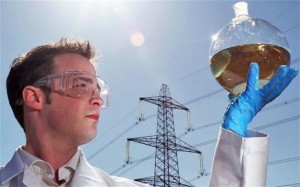With an increasing population tapping depleting aquifers, much of this country (and the world) is on an unsustainable path that is going to lead to water shortages at some point in our lifetimes. We will adapt, it’s what we’re good at, but we need to be aware of how water is being used in our lives to know what to change. I’ve seen a few topics in the news lately that might not be obvious water hogs.
The first is fracking, for which the debate seems to focus on threats to our water supply, caused by leaking fracking fluids which threatens our groundwater supplies. While that’s being debated endlessly, there’s another water issue being overlooked. That is, the water that is used by the fracking process. According to Frack Free Colorado, each well requires 2-8 million gallons of water to create, and may require additional water over its lifetime if it needs to be re-fracked.
Biofuel is talked about as one solution to our energy problems, providing both a local fuel source, and a lower carbon liquid fuel option. Well, notice that word, ‘liquid’? You guessed it, biofuel production uses large amounts of water. The world consumes about 32 billion barrels of oil per year…that’s about 1.34 trillion gallons. One gallon of biofuel takes about 3.25 gallons of water to produce…the math just doesn’t add up here. When water shortages occur, the priority will have to be water for people and crops…there just won’t be enough water left to use for fracking or biofuel production.
Lastly, there’s the issue of groundwater pollution…which isn’t something most people really think about. However, check out the EPA’s How’s My Waterway website to get the scoop on water quality of streams and rivers near you. It’ll tell you about water tests for metals, pathogens, pesticides, etc. You might be surprised by what you find…I know I was!

